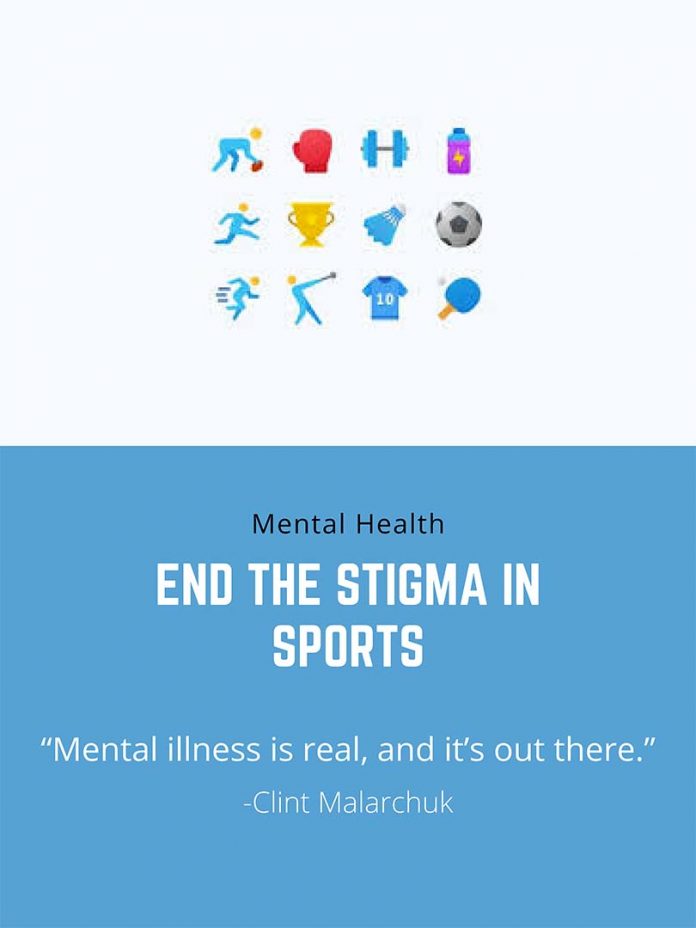Clint Malarchuk, the former NHL goalie known for a 1989 tragedy when he was slashed with a skate to the jugular during a game, has come public with his battles with depression and mental health during his professional hockey career.
He came out with his story to try and break the stigma in sports.
Malarchuk said in a documentary produced in partnership with Religion of Sports on NBC Sports Regional Networks, he never wanted to admit he was struggling because of the stigma against mental health in athletes but he said: “Mental illness is real, and it’s out there.”
According to Mental Health in the World of Sport (CAMH), one in five individuals is affected by mental health. The stigma around mental health in sports is predominantly due to the need to appear physically and mentally fit.
Mental health concerns impact athlete performance in different ways, according to a statement put out by Montana State University.
Mental health challenges in athletes include stress, anxiety, depression, eating disorders, trauma, substance use, and loss of relationships. These all impact athletic performance.
After Malarchuk’s injury, he suffered from post-traumatic stress disorder, along with alcohol abuse, depression, and OCD.
Montana State said that in a 2019 study, researchers found that about one-third of male student-athletes and half of female student-athletes reported being impacted by anxiety in the last 12 months.
Anxiety was also listed by student-athletes as one of their top three mental health concerns. In the same study, about 21 per cent of male student-athletes and 28 per cent of female student-athletes reported they “felt depressed” in the last 12 months.
It is worth noting, this study was conducted before the impact of COVID-19.
According to The University of British Columbia (UBC), the UBC Thunderbirds and 2016 Summer Olympian, Emily Overholt said, “I think being at the Olympics was a distraction,” reflecting on that time. “It was such a high. I put the depression to one side and just buried it.”
According to Athletes for Hope, 33 per cent of all college students experience significant symptoms of depression, anxiety or other mental health conditions. Among that group, 30 per cent seek help but of all college athletes with mental health conditions, only 10 per cent do.
Bryan McLaughlin, the Mental Performance Consultant for the Ridgebacks at Ontario Tech University, said elite athletes are going to be more susceptible to mental illness compared to non-elite athletes, based on what they must deal with from a day-to-day basis and their workload.
McLaughlin points to the experience of Naomi Osaka, a professional tennis player, who withdrew from the French Open because of her struggles with depression.
“And you know, there’s an elite-level athlete who’s very young and she’s able to express that. And, you know, she was criticized against it. So, there was, you know, as much as society says, like, you know, we’re ending the stigma, it’s really what they’re saying and what they’re doing are two different things. So that’s what’s causing this big disconnect and a large aspect of distrust between what people say and what they actually do,” says McLaughlin.
Crystal Garvey, Nursing Professor in the Bachelor of Science in nursing collaborative program between Durham College and Ontario Tech University, says there is an increase in mental health issues in professional sports because of the expectations for athletes, and the competition between athletes to get into professional sports is very high.
She says it does have an impact on individuals’ mental health. Garvey says it depends on the athlete and their stance on mental health and coming public about it.
“It really goes down to individual perspectives what they believe about it. Culture plays a major role as well. Like Canadian culture, we are very open about it. If you think about other cultures, it’s hard to grapple with what their stance is on it. And a lot of times some cultures don’t even believe mental health really exists,” says Garvey who has over 20 years of clinical nursing experience specializing in emergency nursing. and significant experience working in the community, mental health, and acute adult health care settings.
McLaughlin says despite the push to end the stigma around mental health, it is still a large problem within the elite sport world.
“I think also because they’re under the spotlight, they don’t want to appear to be weak in the eyes of, say, their coach or anybody that’s involved with athlete development because there is a power dynamic between a coach and an athlete, and if the athlete gives a coach a reason not to play him or her, then you know, it’s not ideal for that athlete,” says McLaughlin.
Personal mental health stories like those shared by Clint Malarchuk, Emily Overholt and Naomi Osaka can make a difference.
Athletes breaking the stigma will lead others to find the strength to get help themselves.




